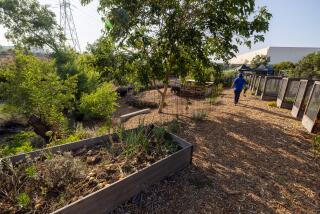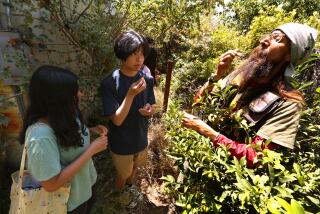Environmental Volunteers Go for the Green
Kermit the Frog lamented, “It’s not easy being green,” and for the most part, he was right. Environmental volunteerism, or any volunteer trip for that matter, usually entails donating more than time and energy. Do-gooder organizations rarely have the resources to fly, house and feed their volunteers; thus their projects are inaccessible to many people who would otherwise be eager to pitch in.
But one group has managed to change that. Since 1957, the Student Conservation Assn. (SCA) has organized projects for Americans of all ages (but mainly younger people) in national parks and forests, hoping to inspire them to careers in conservation. And with all-expenses-paid internships, which include a $50-per-week stipend, it is enlightening their minds without lightening their wallets.
Of course, the program is not for everyone. The minimum commitment is 12 weeks, and some internships extend for a calendar year. Students, who can take a semester or a year off and already have summers free, are probably in the best position to take advantage of SCA’s program, but it is not restricted to college kids. As long as you’re 18 or older, with a high school diploma (or equivalent), you’re SCA material.
“The internship program we offer covers every wilderness discipline you can imagine,” explains SCA communications director Kevin Hamilton. Programs are in all 50 states and involve participation in such fields as archeology, cave management and wildlife biology. And although some internships look for people with a background in a particular field, SCA doesn’t require specific training.
Dan Bevacqua, a 19-year-old student at Emerson College in Boston, is interning at Yosemite National Park through the SCA. He divides his time between giving out permits in the wilderness restoration office and spending time in the back country, looking out for the well-being of park visitors and the land. “It’s definitely good to give something back,” he says. “And it’s nice to know what effort it takes to make the park work.” The writing major doubts he will go into conservation as a career, but he believes his SCA experience will color his outlook forever. “It’s a part of me and part of my thinking now,” he says.
Like Bevacqua, most interns are deployed for a specific service. But tasks vary widely, depending on the location of the program. Hamilton says the Big Cypress National Preserve in Florida gave its 30 interns a feel for a spectrum of conservation disciplines last year. “The interns conducted a variety of projects--building new trails, removing invasive species, really across the board.” Other SCA interns have been kayak guides, participated in archeological excavations, led tours of geological areas and assisted with search-and-rescue missions.
It’s certainly harder work than the average vacation, but the benefits are bountiful. Hamilton praises the constant training from outdoor professionals and the unparalleled hands-on experience. And besides receiving transportation to the site, accommodations, food and the weekly stipend, SCA interns qualify for AmeriCorps education awards. Their size depends on the length of service; 12-week interns get $1,180, while a yearlong internship earns $4,725.
The SCA Web site, https://www.sca-inc.org, explains the background of the program and lists internship opportunities. Select the length of time you can give and where you want to work or what sort of things you want to do, and the positions that fit will appear.
Each listing explains what that particular internship entails and what the program is looking for in applicants. To apply, select a few jobs you would be interested in and fill out the application. Information about SCA also is available at (603) 543-1700.
SCA sends the applications to its partner agencies and organizations, and their professional staffs do the selection. About half the applicants get placed in an internship; those who apply for the summer months have the best shot.
Hamilton encourages anyone with an interest in the environment to apply. “It’s a transformational experience,” he says.
And for anyone interested in pursuing conservation professionally, SCA is a popular first step: 60% of its interns go on to a career in the field.





